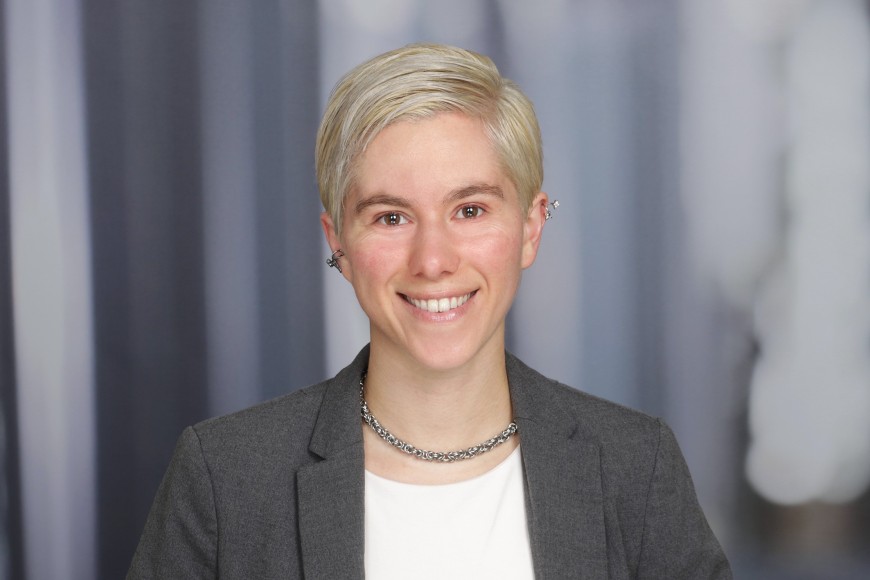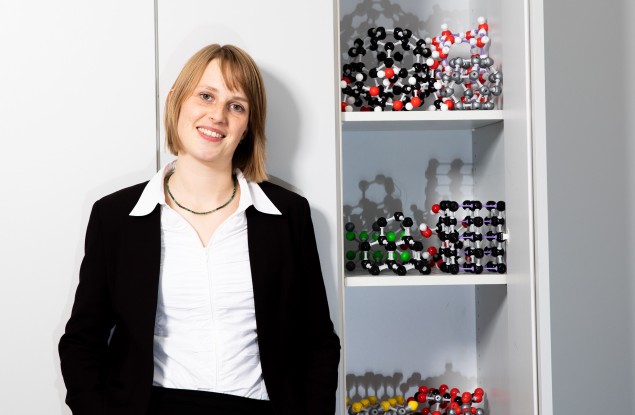Dr. Maria Drosou heads new group as a Liebig fellow
Maria Drosou joined TU Darmstadt as a Liebig fellow group leader in July, hosted by Prof. Vera Krewald
2025/08/28
From water to oxygen: the reaction that sustains life on Earth is the key to a carbon-neutral energy future. A new research group at TU Darmstadt leverages high-level quantum chemical approaches to uncover the fundamental principles of water oxidation at the molecular level. Theoretical chemist Maria Drosou will receive €122,400 in funding over the next three years as a Liebig fellow supported by the Fonds der Chemischen Industrie for her project “Electronic Principles of Water Oxidation in Cobalt-Based Clusters”. The group’s mission is to establish design concepts for the catalysts of tomorrow.

Elucidating the electronic principles of water oxidation
From water to oxygen: the reaction that sustains life on Earth is the key to a carbon-neutral energy future. A new research group at TU Darmstadt leverages high-level quantum chemical approaches to uncover the fundamental principles of water oxidation at the molecular level. Theoretical chemist Maria Drosou will receive €122,400 in funding over the next three years as a Liebig fellow supported by the Fonds der Chemischen Industrie for her project “Electronic Principles of Water Oxidation in Cobalt-Based Clusters”. The group’s mission is to establish design concepts for the catalysts of tomorrow.
Despite decades of research, the exact electronic events that occur during water oxidation remain unknown, and the structural requirements for efficient catalysts are still lacking. This makes the oxygen evolution reaction the critical bottleneck of artificial photosynthesis, slowing down the entire water-splitting process and limiting the generation of sustainable solar fuels. The new group is taking on the grand challenge to elucidate the detailed mechanism of water oxidation, linking theoretical predictions to experimental spectroscopic data. Drosou’s group seeks to describe the flow of electrons as bound oxygen species combine to generate molecular oxygen in multi-spin transition metal-based catalysts leveraging state-of-the-art quantum chemical methods. Deep understanding of this process will guide in silico exploration of robust and efficient catalysts for solar fuel generation through artificial photosynthesis.
From biological to bioinspired artificial water splitting catalysts
The new project builds on Drosou’s dual background in experimental and computational investigations of natural and artificial photosynthesis. Her doctoral studies at the University of Athens focused on bioinspired catalysts for hydrogen evolution. Later, as a Humboldt postdoctoral fellow at the Max-Planck-Institut für Kohlenforschung, she deciphered mechanistic aspects of the unique natural water oxidation catalyst, the oxygen-evolving Mn₄CaO5 cluster of Photosystem II.
She now goes a step further to bioinspired cobalt-based clusters that are emerging as model systems for water oxidation. “By simulating how the system’s wavefunction evolves during the catalytic cycle in well-defined molecular complexes, we seek to uncover the fundamental principles of water oxidation to enable rational design of the next generation of molecular catalysts and functional materials,” says Drosou. In this way, the group aims to bridge fundamental theory with the energy solutions of the future.
About Dr. Maria Drosou
Maria Drosou Dr. Maria Drosou joined TU Darmstadt as a Liebig fellow group leader VCI Liebig fellowship in 2025, hosted by Prof. Vera Krewald Prof. Dr. Vera Krewald. In 2022, she obtained her PhD from the University of Athens, and joined the group of Dr. Dimitrios Pantazis Dr. Dimitros Pantazis at the Max-Planck-Institut für Kohlenforschung.
About the Liebig fellowship
The Liebig fellowship VCI Liebig fellowship of the Fonds der Chemischen Industrie supports prospective university professors in the chemistry sector by providing funding to establish their first independent junior research group.

